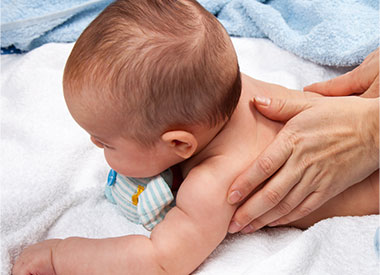When we think about who can participate and benefit from mental health services, we may think of school-age children, teens, and/or adults. While mental health services can be beneficial to these age groups, many individuals may not know that infants can also benefit from mental health services as well.
At El Centro de Amistad, one way in which we support infants’ mental health is through infant massage services with their primary caregivers. We utilize infant massage as an early intervention service to address unique issues and circumstances that may place infants at a higher risk of experiencing mental, physical, or developmental delays as they get older. For example, infants who may have been exposed to substances in-utero may be at a higher risk of medical/physical issues at birth and/or experiencing developmental delays later in life.
Infant massage can have a multitude of benefits for infants and their primary caregivers. Some of these benefits include the following: supporting bonding and attachment, encouraging better non-verbal communication, promoting relaxation/co-regulation, supporting brain/physical development, relieving digestive issues, and relieving pain and tension. In addition, infant massage can also support a caregiver’s mental and emotional well-being by reducing anxiety and stress which supports them in strengthening their connection with their infant.
These are some of the benefits that one of our clients, Michael, and his aunt were able to attain after receiving infant massage services. At the time of intake, Michael was two months old and was referred for infant massage services due to prenatal exposure and was placed in the care of his maternal aunt. Michael was experiencing some mild withdrawal symptoms due to prenatal exposure such as shaking, discomfort upon waking, “uncomfortable” crying, and colic/gas issues. Michael’s aunt described how difficult it was at times to soothe him whenever he experienced any discomfort and would cry often throughout the day. She also expressed concerns regarding how prenatal exposure may impact Michael’s development and wanted to find ways to support him in meeting his developmental milestones as he grows.
Michael was assigned to Alina Gonzalez, LMFT. The focus of treatment was to support the dyad with bonding, attachment, and co-regulation. The hope was to assist with decreasing crying and discomfort due to digestive issues and shaking that were impacting Michael at home. Alina worked with Michael’s aunt during sessions by teaching and modeling co-regulation strategies she can use with Michael such as providing a warm, responsive relationship to meet Michael’s needs, engaging in massage strokes to reduce discomfort, and using gentle movements to promote physical regulation. In addition, Alina focused on the use of psychoeducation, caregiver coaching, modeling, and reflective practice to help increase attachment and attunement between Michael and his aunt.
During treatment, Michael’s aunt was able to increase her understanding of Michael’s non-verbal communication and how to respond to his needs, which in turn began to strengthen their bond and attachment. Michael’s aunt was able to help Michael to co-regulate whenever he experienced any discomfort or began to cry, which supported safety in the relationship. These skills were taught to continue supporting Michael in maintaining healthy attachments with his caregiver as they moved forward with navigating visitations with Michael’s mother.
After six weeks of treatment, the aunt reported that Michael had experienced a significant reduction in crying, and colic/gas issues, and was no longer shaking or experiencing any pain/tension in his body. The aunt also reported feeling less anxiety and more confidence in her ability to understand Michael’s cries and non-verbal cues to effectively meet his wants/needs. Michael’s aunt noted Michael appeared much happier, was always smiling, and is more playful when he interacted with her, his uncle, and other family members in the home.
During the discharge, the discussion centered around changes that the family has established and strategies to continue supporting Michael’s ongoing development and mental/emotional well-being. Michael and his aunt were able to establish a stronger bond and attachment that will continue to support them as they navigate Michael’s development and have more hope for the future ahead.
If you would like to learn more about our Infant Massage services and how to refer your child, please click here.
Article written by Alina Gonzalez, MS, LMFT


